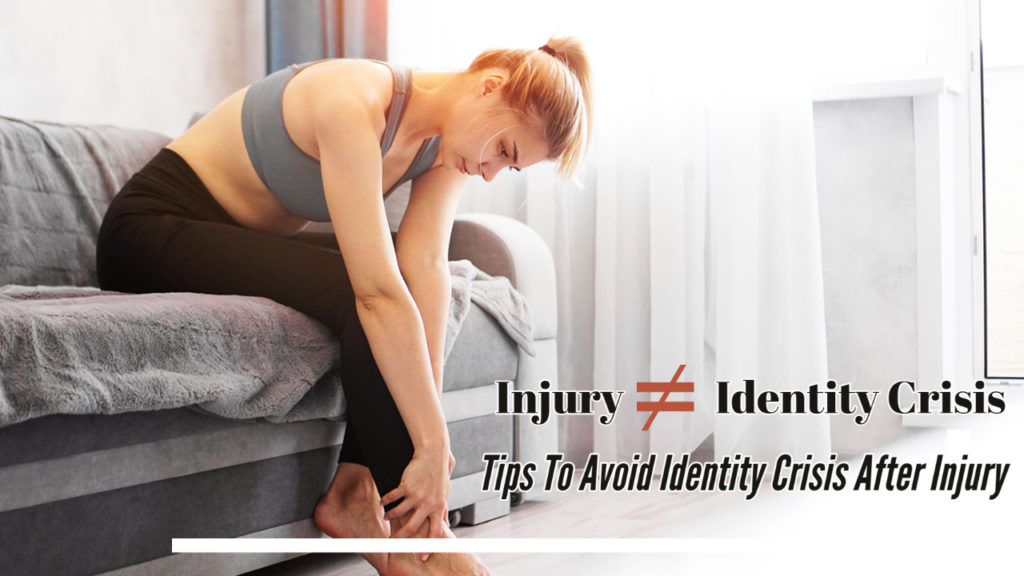Avoiding Identity Crisis
How to not fall in the deep end.
It’s been over a year since COVID shut us down and changed our lives. Time flies when you’re stuck at home.
I feel like I’m living in an alternate universe. I’m sitting here writing this from a warm and sunshiny place. During my short hiatus from the office, I’ve had a lot of time to sit back, relax and reflect. What I’ve been reflecting on….how my life and identity sure have changed in the past ten years.
Here’s a little story for ya’ll.
When I was 16 years old I had my first knee surgery. By the age of 21, I had had 2 more and was on the path to number 4. What changed? A surgeon literally scared the crap out of me. Thank you, Doc… not.
I was a 20-year-old girl, who identified as a college soccer player. Until… one day a surgeon said that I should stop playing if ” I knew what was good for me”.
He scared me with stories of tibial osteotomies and knee replacements by 30. He said, “Why keep playing if you’re never going to be a pro.” I was in his office sitting there thinking, what the hell am I doing on the field anymore. If I can’t do what I love without worrying, why do it at all?
Later that week I quit. I walked into my coach’s office and simply said “ I just can’t do this anymore”. I was lucky enough that all three of my coaches were there at one time. They all stared at me perplexed and said, “ Never a day in our lives did we expect this.” The sad part, I felt alone and I felt like a quitter.
Insert Identity Crisis Here.
Identity Crisis (n): a period of uncertainty and confusion in which a person’s sense of identity becomes insecure, typically due to a change in their expected aims or role in society. – Oxford Languages
Here I am 10 years later thinking how much different things would be knowing what I know now. In hindsight, the first thing I would have done is …. ditch that idiot doctor. (If a doctor ever speaks to you the way I was, run for the hills. PLEASE!)
Recovery & healing are not about being told what to do. They are about creating a path for success no matter what your ultimate decision is. At 20, I was young. I jumped to conclusions based on information from a doc that had met me…once. My best advice, take your time before you rush to decisions.
This is why I help my athletes do their best to keep their identity even during injury. So here are a few tips to keep you from getting thrown into the identity crisis deep-end.
- Find a supportive care team. Make sure you have providers whose goals align with yours. Decision-making should occur together with a well-delineated plan in place. If you’re not feeling the connection, keep looking. Docs, physios, mental health providers… they all matter!
- Set personal goals. You are what matters most in difficult times. At 20, I thought quitting soccer was the best thing for my mental health. Instead, I entered into a second mental health crisis. Whether returning to sport or not, creating smaller goals that lead to a bigger goal will help you succeed no matter what! Heck, if you’ve wanted to write a book- you can do it!
- Focus on what you can control. Some things are simply out of your control. Don’t perseverate on the little things and think about your bigger goal. Things such as healing time are highly variable. However, you can control how often you do your strength training & physical therapy exercises. 🙂
- Find a hobby. This is where I failed. After I stopped playing soccer I was simply a college student. After graduating I faced a second identity crisis. Make sure that you take advantage of other things you love in life. Cooking, cleaning, hiking, running, writing, sewing… whatever it may be.
- Avoid isolation. Don’t let yourself sit idle. Although you feel like you “lost” your old posse, I’m sure they’ll be your biggest support system. If that is not your best choice, start exploring. Join a book club, hiking club, or something else that suits your fancy!
- Optimism. Stop the pessimism and make sure others around you do too. I was stuck in a negative place in college. I had supportive teammates but also many others who were less than encouraging. Surround yourself with people who will aid in your recovery and any choices you make.
These may seem like common sense but….we often forget to put ourselves first.
If you’re an athlete experiencing an identity crisis, I can assure you that you are not the only one. It will be okay.
If you have experienced an identity crisis post-injury, I would love to hear your story. Also, please don’t hesitate to ask any other questions you may have.
Yours in Health,
